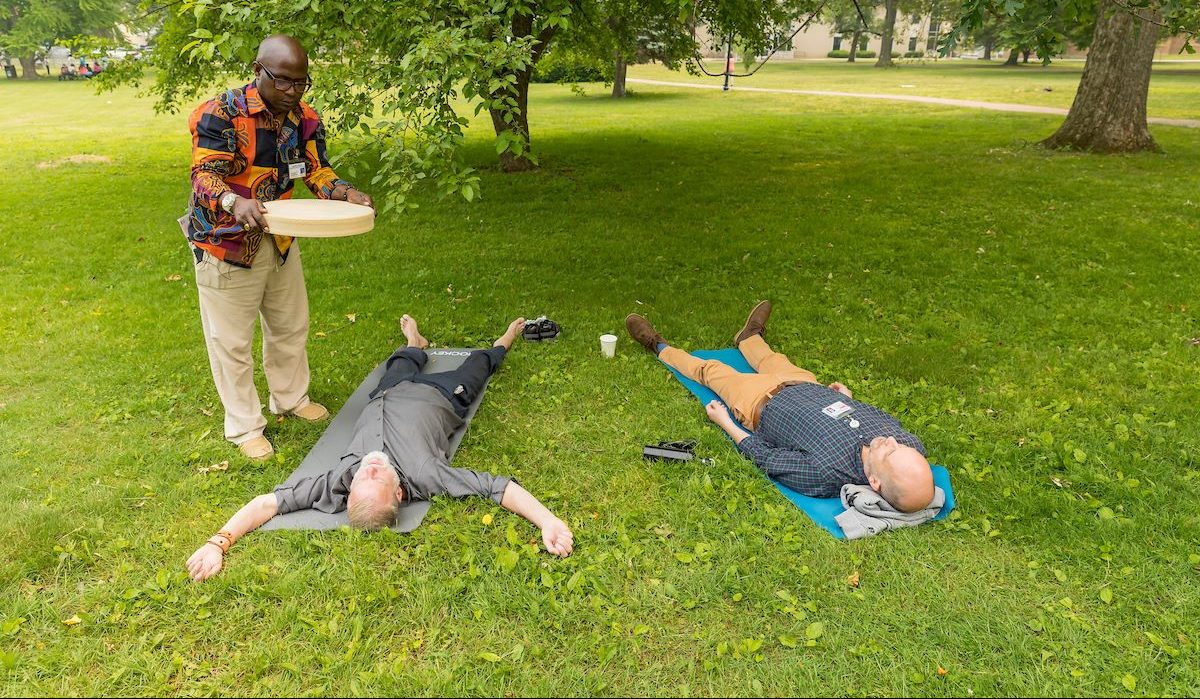<< Back
Recovery Leadership Academy Provides Career Path for Those in Recovery

June 16, 2023
Whenever she applied for a job, Kim Horowitz felt sick to her stomach, worried someone would ask about the gaps in her resume from bipolar disorder.
Jacky Rodriguez wanted a career helping people, but time in prison in her 20s limited her to waitressing.
And, no one knows better than Karen Kangas, EdD, the career obstacles mental health and addiction issues can create.
Dr. Kangas, well-established as an elementary school principal when diagnosed with bipolar disorder, self-medicated with alcohol and was fired. During recovery, she decided to use her story to help others in recovery them find a purpose and career.
She launched Recovery University to teach those in recovery to become peer support specialists. Joining Hartford HealthCare’s Behavioral Health Network as directory of recovery and family affairs, she launched Recovery Leadership Academy in 2019.
The goal, she says, is to have peer support specialists guide others to recovery based on shared experience and understanding of challenges recovery poses.
The Recovery Support Specialist Training and Certification Program is an 80-hour course that prepares those in recovery from psychiatric or substance use disorders, or family members, to become certified Recovery Support Specialists (RSSs).
RSSs are qualified to work in behavioral health systems anywhere in Connecticut, including Hartford HealthCare emergency departments at Backus, Windham, Charlotte Hungerford and Hartford hospitals, The Hospital of Central Connecticut and MidState Medical Center.
‘Ambassadors of hope’
In May, 90 individuals graduated from the Academy. The Fall 2023 session is already full. Currently, Dr. Kangas estimates there are 40 RSSs at Hartford HealthCare.
Having survived addiction or mental illness themselves, RSSs are “ambassadors of hope” for those who are in a recovery program.
“People ask, ‘Will I ever get better?’ ‘Will I ever have a life?’ We can support them because we have had our own experiences,” Dr. Kangas says, adding that the RSSs also benefit. “People in recovery often are denied employment because of their mental health or addiction histories. This gives them a career.”
From peer support to peer mentor
It took prison and a mandated drug treatment program to get Kelvin Young into recovery, and it was Dr. Kangas who helped him find his life’s mission as a RSS. Now 50, Young hosts sound therapy classes at the Institute of Living, in addition to working with patients in treatment.
“In prison, I learned about peer support and peer mentors, and how important they were,” he says. “The counselors there hired me as a peer mentor. What I realized was, the counselors go home at 3 o’clock but the peer mentors stay, sometimes when it becomes the hardest. I know once I got out of prison I wanted to live and work in recovery.
“My lived experience, including the stigma I experienced when I got out of prison helps me understand others’ actions. I can call them out on their BS. Nonclinical peer support is a different relationship. I connect with them on a different level. I give them compassion, respect, empathy, and I listen.”
Offering a program like sound healing, the use of different sounds to improve physical and emotional health, allows people to “leave their diagnosis at the door,” Young says. “We can together celebrate their potential and give them the tools they need to take responsibility.”
Thwarted from her career
Horowitz, who has bipolar disorder, PTSD and ADHD, has faced multiple challenges, including caring for her dying mother and overcoming ovarian and uterine cancer. Now 45, she wanted to be a lawyer. After completing the educational requirements and passing the bar exam, her diagnosis meant stipulations from the Bar Association on how she could practice law.
After learning about Recovery University, she signed up and Dr. Kangas helped her find a job at Rushford, a Hartford HealthCare facility offering prevention, treatment and recovery programs for mental illness and addiction. Today, she is manager of inpatient recovery support services there.
“People can connect to me so quickly because I’ve lived in my car, I’ve had no friends, I’ve had no ties with my family,” Horowitz says. “It’s so gratifying. It means so much to me to connect with people and see them take the next steps in their recovery.”
From waitress to social worker
For Rodriguez, a chance meeting with a stranger when applying for unemployment benefits led her to the RSS program. Since graduating, she earned bachelor’s and master’s degrees and became a licensed master social worker. She worked as an RSS at Rushford for three years before moving to the Meriden Early Diversion, Referral and Retention Project (MERR), a partnership between Meriden police and Rushford that gives police an alternate to arrest when dealing with people having mental health crises.
The work was part of a presentation she recently made at the National Mental Health Conference.
“It’s a miracle,” Rodriguez says of her life. “I’m so grateful I was able to overcome what I went through.